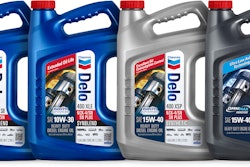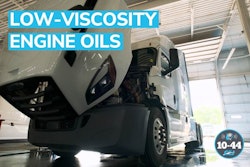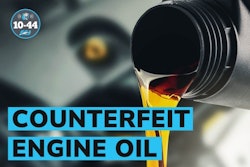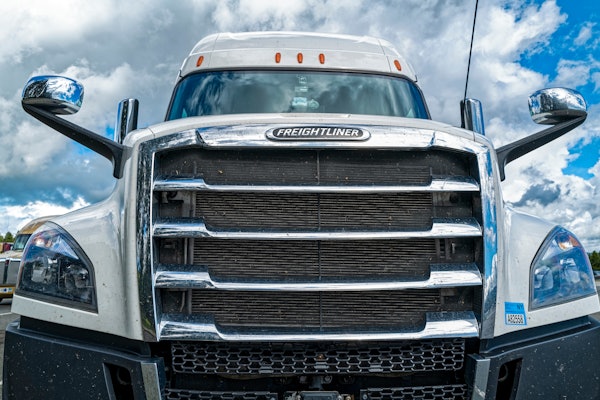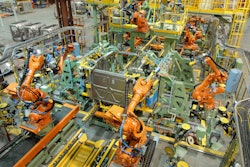Chevron Lubricants (00:00):
This week's 10-44 is brought to you by Chevron Delo 600 ADF ultra low ash diesel engine oil. It's time to kick some ash.
Speaker 2 (00:09):
If you use conventional Delo diesel engine oil, we've got some news for you.
Speaker 3 (00:14):
You're watching CCJs 10-44. A weekly webisode that brings you the latest trucking industry news and updates from the editors of CCJ. Don't forget to subscribe and hit the bell for notifications so you'll never miss an installment of 10-44.
Jason Cannon (00:28):
Hey everybody, welcome back. I'm Jason Cannon, and my co-host on the other side, as always, is Matt Cole. There's been an ongoing migration for many years away from conventional diesel engine oils, towards synthetic and synthetic blends. Chevron Lubricants Delo brand is expediting that transition on the product side by dropping its popular DELO 400 SDE 10w30, and 15w40, along with its Delo 400 XLE 15w40.
Matt Cole (00:56):
Just about every oil supplier had difficulty getting product to market during the pandemic. And by removing the conventional oil from the Delo line, Chevron Lubricant says it's able to shore up its supply chain while also stabilizing prices to the end user.
Jason Cannon (01:10):
Joining us on the 10-44 this week is Chevron Lubricant senior staff engineer Shawn Whitacre. And he says, Delo's decision to offer only premium synthetic, and synthetic blend products, comes from influences from both the broader market and from evolving customer tastes.
Shawn Whitacre (01:24):
If you think back in 2016, or so, is when our last major revamp of our product line, and that aligned with the introduction of the API CK-4 and FA-4 categories. And at that point we had products that spanned from a low viscosity FA-4 10w30s, all the way up to the conventional 15w40s. Along the way, we added even more products. We added a couple of grades into our ultra low ash portfolio, which has been a very successful product introduction, as well as a full synthetic 15w40. Then the pandemic hit and we started taking stock of the entirety of our portfolio. There were some supply challenges that were largely out of our control, but were prompting our need to rethink how we go about the entirety of the portfolio. We also recognized that customers themselves were making a shift in their purchase habits and their priorities around their engine oil.
(02:28):
We used a combination of factors looking at portfolio complexity, supply chain reliability, and actual customer need narrow down the choices a bit and offer the products that the largest majority of our customers are demanding.
(02:45):
We're expecting that these products be used in the very same applications that customers of the Delos 400 SDE platforms are using today. Like any transition to a new, let's say formulation, you will anticipate that you'll see changes in metals that you see in your used oil analysis, but these will be relatively subtle changes, and certainly won't impact the actual performance of the oil. I think what we'll see is that very little impact on end users, and we anticipate everything to be a very positive change. Even in terms of just narrowing down the selection of products. I kind of liken it... I do a lot of the grocery shopping around here, and you get overwhelmed when you're looking at bread, or yogurt, or milk, or something. There's so many choices. We're trying to simplify the selection into the few products that allow for the greatest versatility to meet end-user demands. And so, I think that's really the essence of what we're doing here, is trying to simplify that portfolio in a way that helps best align with customer needs.
Matt Cole (03:53):
The evolution of diesel engines, namely how hot they get as part of the effort to reduce emissions and improve fuel economy, has placed a greater emphasis on synthetics and synthetic blends.
Shawn Whitacre (04:03):
If we look over, maybe a 10-year time horizon, this really dates back to 2013, or so, when large majority of engine builders were beginning to allow for the use of 10w30 motor oils. That's when we saw a marked shift towards semisynthetic, or even full synthetic products, because this was becoming a tangible offer for fleets that were looking for fuel economy improvement. I think what we've seen along the way is that growing from that small base up to where it is now, where it represents maybe 20 or 30% of the portfolio, and I think even as we look down the road, client estimates that the premium tier category could represent something like 20% of the market by 2027. We really recognize that this is a trend. It's fuel economy driven. It's oil drain interval driven. It's oil consumption related factors. All of these things point towards a greater appetite towards the synthetic blends and the full synthetics.
Jason Cannon (05:15):
Beginning in about mid-January, Delo customers will have a couple of options once the SDE and XLE conventional products are sunsetted. Sean tells us what those are after a word from 10-44 sponsor, Chevron Lubricants.
Chevron Lubricants (05:28):
Protecting your diesel engine, and its aftertreatment system, has traditionally been a double-edged sword. The same engine oil that is so essential to protecting your engine's internal parts, is also responsible for 90% of the ash that is clogging up your DPF and upping your fuel and maintenance costs. Outdated industry thinking still sees a trade-off between engine and emission system protection, and Chevron was tired of it. So, they spent a decade of R&D developing a no-compromise formulation. Chevron Lubricants developed a new ultra low ash diesel engine oil that is specifically designed to combat DPF ash clogging. DELO 600 ADF with OMNIMAX technology cuts sulfate ash by whopping 60%, which reduces the rate of DPF clogging and extends DPF service life by two and a half times.
(06:12):
And just think what you can do with all the MPGs you're going to add from cutting your number of reagents. The Delo 600 ADF isn't just about after treatment. It provides complete protection, extending drain intervals by preventing oil breakdown. Before, you've had to choose between protecting your engine or your after treatment system, and now you don't. 600 ADF from Delo, with OMNIMAX technology, it's time to kick some ash.
Shawn Whitacre (06:35):
We're removing what was historically called Delo 400 SDE, offered as both a 15w40 and a 10w30, but replacing it with a product, Delo 400 XLE SB, that meets all the same claims as the prior product, in fact some more. So, we've, along the way, we've looked at claims and approvals that a majority of our customers were seeking. With the new product, we'll be able to offer approval for use in the Ford platforms, as well as Allison TES 439, gives the end user a greater versatility to use these products in a broader mix of hardware.
Matt Cole (07:13):
Customers who have a firm and unwavering preference for conventional engine oil have an option too, but it's from Chevron Lubricants Ursa brand.
Shawn Whitacre (07:20):
All the changes that we're making, the consolidation of the product tiers, is really focused on the Delo portfolio. So, we've gone from essentially four tiers of products within Delo, down to two. But for customers that still want the cost-effectiveness the other attributes that a conventional oil brings, we do still have the Ursa product line, both 15w40 as well as a 10w30, that are conventional and offer that very cost-effective performance. But, with the product claims that most trucking fleets are looking for these days.
Jason Cannon (07:59):
Delo 400 XLE SB 15w40 will be offered at the same price as the outgoing 400 SDE 15w40. So customers who convert to the syn/blend product will essentially be getting all the benefits of as syn/blend for free.
Shawn Whitacre (08:15):
So, specifically, as it relates to the things that synthetic base oils bring to the table, they're lower volatility, they offer better cold-flow performance, they can bring benefits and oxidative stability. All of these are, kind of, attributes that are the backbone to modern requirements. When we look at putting together fully functional oils that meet the very demanding challenges of OEM specs and industry standards around the globe, synthetic base oils are becoming a more and more important part of that equation, allowing us to meet those products, but in a very, cost-effective manner, deliver on the requirements of our end users for long oil life, good versatility to use the same product across multiple tiers of hardware, as well as backwards compatibility.
(09:08):
What we're seeing with the new XLE SB product, just like we saw with Delo 400 SDE, is in many cases, robustness to go beyond the average market oil drain interval, in some cases up to 50% beyond. Now, of course, it's always important to understand individual duty cycles, hardware needs, your own maintenance practices, before finalizing on an actual oil drain interval, because there's a number of factors that influence what's right for your operation. But, in many cases, these Delo products do have that robustness to go further, and it's a really good opportunity to have that engagement with your oil marketer, or Chevron representative, to reevaluate what makes best sense for your operation.
Chevron Lubricants (09:58):
That's it for this week's 10-44. You can read more on CCJDigital.com. While you're there, sign up for our newsletter and stay up to date on the latest in trucking industry news and trends. If you have any questions or feedback, please let us know in the comments below. Don't forget to subscribe and hit the bell for notifications so you can catch us again next week.

